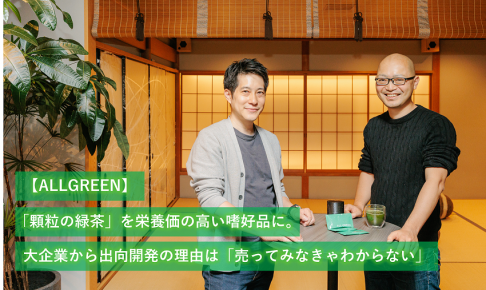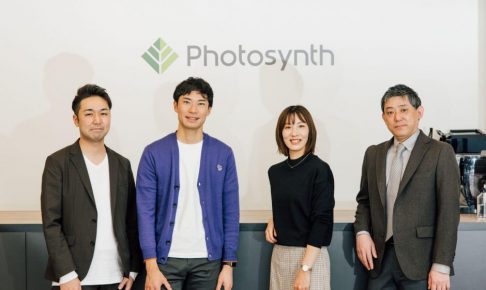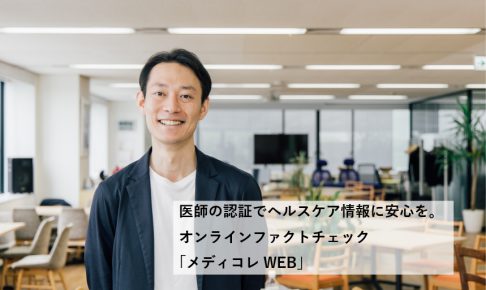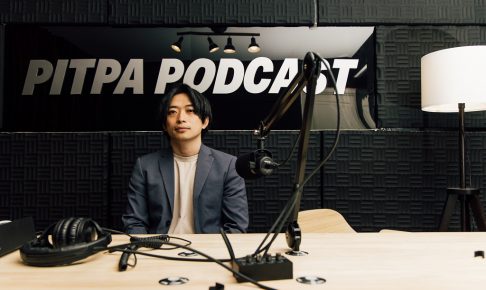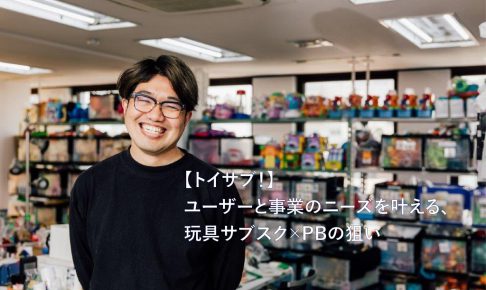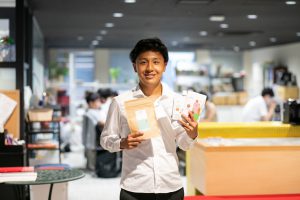WE Fabric starting from Osaka. He is working on a BtoB fashion freema site named "smatter". Looking at the site, jackets, shoes, stalls, fabrics, everything is sold at a much cheaper price than the normal distribution price.
It's not just a service I just made because it's convenient. In the fashion industry, excess inventory and its disposition have been a long-standing challenge, and it is about to put a scalpel on that task. We talked to Mr. Fukuya who is representative of We Fabric.

Fujii Tsuyoshi President, We Fabric Co., Ltd.
When traveling to Kansai Gaidai University, travel alone over 40 countries. Shop staff at URBAN RESEARCH at the same time, after joining Takita Osaka after having experienced as an assistant buyer related to apparel at the time of study abroad in New York. About 10 years at the company, we consistently do planning, production and sales of textile products, planning, producing and selling in large quantities in these experiences, and discarding what left behind by ourselves I feel doubt in particular. Retire from a trading company and start business in March 2015 to change the current situation of the textile fashion industry which has various problems.
Flea market site of textile and fashion industry "Smasel"
Retailers have inventory because they want to prevent opportunity losses. The factory can not stop the machine, so inventory will increase. That's why trading companies in between have obvious stocks.
Since everyone has extra stock, dead stock increases. There is a large amount of stock at every and every place from upstream to downstream of the commercial flow, most of it is discarded. It seems that inventory of 1.7 million tons is being disposed of in Japan annually. That is the current situation of the fashion industry.
The service trying to solve such a situation is a service provided by We Fabric Co., Ltd.SMASELL (smatter)That's it.
スマセルは「繊維・ファッション業界のフリマサイト」。フリマとはいっても利用するのは企業・法人で、在庫(デッドストック)を売買することが可能だ。

Proper disposal of corporate dead stock
With regard to textiles and fashion, smasell's categories are divided into the following.
1 Apparel · Fashion Products
2 Interior · Lifestyle products
3 Textiles · Accessories (buttons and fasteners)
Since it is a BtoB service, it can not be seen by general consumers, but when looking into the service, jackets, shoes, watches, stalls, raincoats and the like are lining up in a row. Since it handles the entire BtoB material, not only apparel products but also pre-processed items such as textiles and fabrics are sold. Unlike the Fima with CtoC, it is also characterized as being sold in lot rather than one unit.
Until now, Deadstock has sold to a cheap dealer called a hut, called a hut, in two sentences briefly before the settlement of accounts, or paid money to the industrial waste dealer for disposal. However, even if it is a dead stock, there are many things that are not problematic as a product, just what the items two years ago had been carried or the season passed. The disposal is still usable, and in fact it may be what someone is asking for. With smattering you will be able to sell dead stock that you could not sell until now.
For example, if you are an apparel, how to sell this product made this season is the main job, that is the most fun. Since stock disposal is not main work if it is from the side of the seller, it tends to be postponed.
If it is smarter, you can trade more easily than traditional inventory disposal, and profitability will also increase in terms of monetary value. I'd like you to leave the troubles to smatter and focus on the main work. (Mr. Fukuya, the same below)
Smussel is a BtoB's free-space site
Smacell also benefits buyers such as department stores, GMS (comprehensive supermarket) and discount stores. First of all, Class A products are purchased cheaply. It is not unusual to have been sold at around 10-20% of the final price in Smussel.
When dealing with a new company newly, there may be a fee like registration fee, and we had to deal with credit and prepayment etc for credit selling. However, this registration takes time and cost, especially for small and medium-sized enterprises, the burden is heavy.
But Smussel does not need to open a credit account by bank trust service. By doing this, for example, select shops and others will be able to purchase from a wide range of channels, the lineup may expand. By the way, smatter users are basically companies, but individual business owners who passed judges can also use it.
If every company sells a variety of merchandise, you may imagine an exhibition if you are familiar with fashion, but the exhibition is a goods item that you want to sell this season in line. On the other hand Smussle deals with bargain goods.

Resolve industry negative of stock disposal
Mr. Fukuya developed Smussel because he had his own experience.
I have worked for about 10 years at my previous job, textile trading company. Since it is a trading company, we have planned and sold large quantities, and we have disposed of large amounts of inventory. As a matter of fact, I felt guilty as a supplier. However, this was not only problems of the company but also the problem of the entire industry. I decided to start up and tackle this problem.
Mr. Fukuya who retired from a trading company founded We Fabric. At first, he developed a brand called "RDF (ARDEEF)". It is an ethical brand that buys corporate dead stock cheaply and manufactures items based on it.
With a new concept in the industry as well, a lot of inquiries will come about "Will you handle items of ours?" But Mr. Fukuya said that he was conflicting.
Although it is a pleasant thing, we can not accept all the inventory remaining in Japan at We Fabric, so we only had to refuse most offers.
We are trying to solve the problem of disposal, but what are we going to do with this refusal? I knew that there are many people who need products deadstock or dead stock, so I felt I had to deliver dead stock properly to the people I want.
We have to optimize the surplus resources somewhere and match people who find value in the merchandise. As a result of repeated trial and error, We Fabric reached Smassel and launched in July 2017. At the time of the interview all 250 companies are registered services.
Increase fellows inside and outside the company with the mission "Recycling society without disposal"
Smussel attempts to solve the inventory problem of the fashion industry with a platform called Fima. What kind of human resources are adopted?
Half of the number is from the fashion industry. I emphasize sympathy for the mission rather than industry experience or skill.
Smascel's mission is "a recycling-based society without waste". As mentioned above most companies in the fashion industry are plagued by dead stock. It seems most important whether we can sympathize with you here.
Also, the mission of eliminating waste and creating a recycling-oriented society seems to be effective not only for internal employment but also for outside companies.
For smatter customers, there are a lot of people who will sell and purchase because they will sympathize with the mission. Everyone recognizes that deadstock is an industry issue, but until now you have not been able to do it. You are becoming a user by saying "I am glad if Smussel solves it."

By the way, We Fabric is a company in Osaka. It seems to be asked that good talent is in Tokyo, "There are lots of excellent people in the Kansai!" And lol. If you would like to work in fashion, recycling society, Osaka, please check out Wie Fabric.
First of all, it is the position of "smattering in the textile and fashion industry"
Up to this point, we have talked about the fashion industry on the premise for the sake of convenience, but there may be no industry without disposal in the industry dealing with things (by the way, Japan imports 55 million tons of food annually and 18 million tons It seems to be discarding it). In other words, inventory problems are not limited to the fashion industry, which is a common problem in most industries, and it is annoying in any industry.
Actually, from other industries, it seems that there are many inquiries "Can you sell with smattering?" "Can not do smassel's mechanism in this industry" as well. However, Mr. Fukuya says, "There are no plans to do other industries."
In the meantime I am from the fashion industry, I will build a firm position standing "smatter" in the textile and fashion industry.
We have received a call from other industries, but I think that it is difficult for us to enter in the short term, either expertise is required or unity of brands.
Nonetheless, our mission is to eliminate waste, so I do not know in the long term.
Also, dead stock is not a domestic problem. There are cases where Japanese companies have factories outside of the country and there are inventories there, and overseas companies hold stocks as a matter of course. Naturally they should have incentives to sell inventory. Mr. Fukuya also is keen to say, "I would like to make it a platform that can share inventory globally."
I would like to work with those who can sympathize with the mission of eliminating waste and creating a recycling society. Of course we are glad to be a member of our company, but smattering requires a collaborator outside the company. Please do speak to us either as a user or as a partner.
Problems in the inventory of the fashion industry are serious, everyone has bothered me and I am not kind to the earth. Wiefabrik is trying to solve the problem with BtoB's free-kicker with "a recycling-based society without waste" set. Mr. Fukuya who has been looking into the fashion industry knows the back side of the industry, and he has also experienced that painting more than anything.
If you would like to solve the industry negative as We Fabric, or if you want to reform the industry with We Fabric, be sure to pay attention to Smussel.
The contents of the interview are also distributed by podcast
We also deliver interviews with podcasts. If you are interested, please also ask here.
Notomi Jumpei
pilot boat, Limited Company
Born in 1987. He graduated from the Meiji University School of Management in 2009 and completed the Graduate School of Accounting at Waseda University in 2011. I passed a certified public accountant examination while I was in college. After a major audit corporation, he joined Tohmatsu Venture Support Co., Ltd. and engaged in venture support. Every week We produce over 300 pitch and venture events, including pitch event Morning Pitch. In 2017 he independently established a joint venture company pilot boat and continued to engage in venture support. Currently hosting BtoC venture presentation event "sprout", venture How to introduce event "faces" event. FashionTech and other lifestyle-based BtoC services are specialty areas. "Pilot boat" "pilot boat cast" operated.
I'm doing LINE @
We announce you in LINE@ at article delivery. If you would like to be notified of the update of the article, please follow LINE@!
![]()

